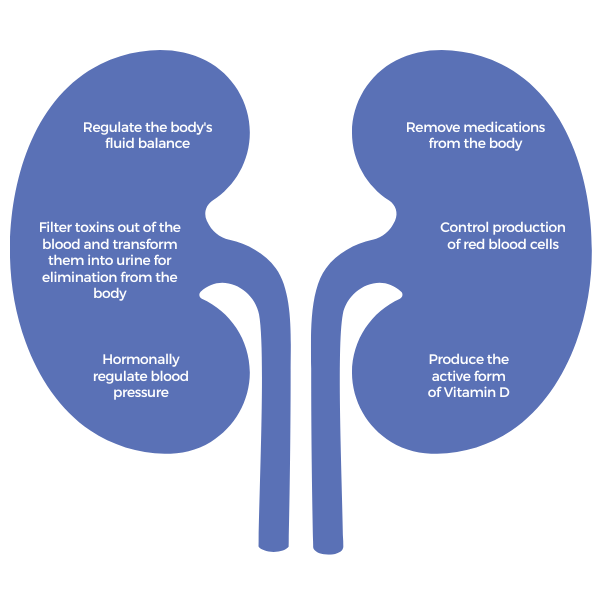How much do you REALLY know about your kidneys? They’re a vital organ to your body and perform a number of functions that keep you feeling your best and help the rest of your organs run well, too!
Kidney Functions
The kidneys have many functions:
- They filter waste and other toxins from the blood to turn into urine for elimination from the body
- Help regulate blood pressure
- Produce red blood cells
- Control the body’s fluid balance
- Remove medications from the body
- Produce the active form of Vitamin D
Common Kidney Problems
Unfortunately, due to many factors, the kidneys can become damaged and unable to perform their functions adequately. More than 1 in 7 or about 15% of US adults are estimated to have chronic kidney disease (CKD)1. Even more concerning is that as many as 9 in 10 adults with CKD do not yet know they have it1.
The top two causes of development of CKD are diabetes and high blood pressure (hypertension). Per the CDC, approximately 1 in 3 adults with diabetes and 1 in 5 adults with high blood pressure are estimated to have CKD. Other risk factors that can lead to CKD include heart disease, obesity, family history of CKD, inherited kidney disorders, past damage to the kidneys, and advanced age.
It is important to follow up with your primary care provider and get your yearly lab work to check the health of your kidneys. CKD can be detected in the early stages and steps can be taken to help slow progression to ESRD.
Understanding Your Labs
Your primary care doctor will keep an eye on your kidney function as part of your yearly labs. Some of the kidney related laboratory tests are explained below.
Serum Creatinine:
Creatinine is a waste product that is found in your blood. It comes from normal muscle activity. Typically, your kidney removes creatinine from your blood, however when kidney function is impaired, creatinine levels will be elevated.
Glomerular Filtration Rate (GFR):
Serum creatinine levels are used to estimate your GFR, which tells your doctor your level of kidney function. There are five levels of chronic kidney disease. (Add GFR chart for CKD stages). Typically, a person with stage 5 CKD and a GFR below 15 would need to consider starting treatment for kidney failure.
Blood Urea Nitrogen (BUN):
BUN is typically removed from your blood by your kidneys as it is a normal waste product that results from the digestion and metabolism of protein from the foods you consume. When kidney function is decreased, the BUN level increases. Note that BUN can also rise, and fall based on consumption of protein.
Urine Protein:
Continuous protein in your urine can be an early sign of CKD. Protein can be present in the urine when kidneys are damaged.
What can you do?
Visit your primary care provider at least once per year for an annual physical and lab work.
Managing diabetes and high blood pressure can involve taking your medications as prescribed, adopting an active lifestyle, and changing your diet. If you have high blood pressure and/or diabetes it is also important to manage these to the targets set by you and your provider. The Dietary Approaches to Stop Hypertension, aka DASH diet, might be recommended for you. This diet is high in fruits and vegetables, low in saturated fat and low in sodium, to help manage blood pressure.
If you want to learn more about the DASH diet or are interested in changing your dietary habits for your health, Avance Care Nutrition is available to help. Learn more by visiting our website or call 919.237.1337 option 4 to speak with a Wellness Coordinator.
Avance Care also offers a free, monthly support group for people living with diabetes and their caregivers. Whether you are newly diagnosed or have been living with diabetes for many years, this group can help you with your diabetes management. Topics include healthy eating tips, stress management, preventing diabetes-related complications and more. Join the support group email list by calling 919.237.1337 option 4 or fill out this interest form below and someone will be in touch soon to get you started.
Resources:
https://www.niddk.nih.gov/health-information/health-statistics/kidney-disease
https://www.kidney.org/atoz/content/understanding-your-lab-values


